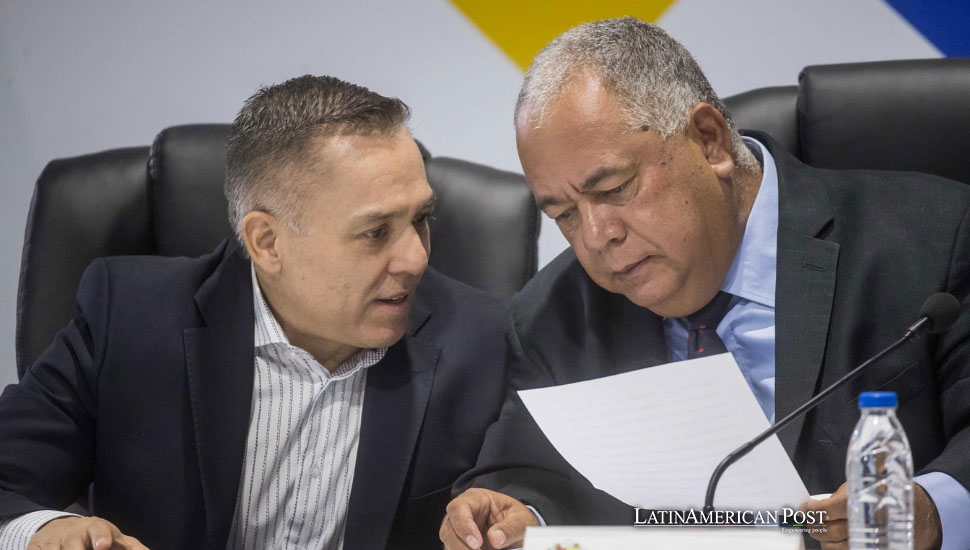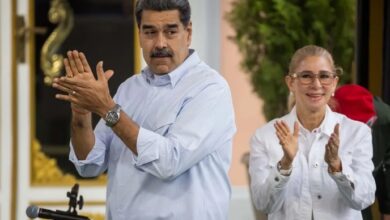Venezuela Revokes EU Election Observers Amid Tensions Over Sanctions

Venezuela has withdrawn its invitation to the European Union to send election observers for the upcoming presidential contest in July. It cites ongoing EU sanctions as a point of contention, which are impacting the transparency and credibility of the electoral process.
In a move that has drawn significant international attention, Venezuela has rescinded its invitation for the European Union (EU) to send election observers for the July presidential election. On Tuesday, Elvis Amoroso, head of the National Electoral Council (CNE), announced the announcement. This decision comes on the heels of the EU’s temporary removal of individual sanctions on Amoroso, which he dismissed, demanding a complete lifting of all sanctions on Venezuela.
Earlier this month, the government-controlled legislature endorsed a measure urging the CNE to withdraw the invitation for EU electoral observers. “They are not worthy people to come to this country… while they maintain sanctions,” Amoroso declared on state television, describing the EU sanctions as “colonialist” and “coercive, unilateral, and genocidal.”
In response, the EU office in Caracas expressed deep regret over the CNE’s decision and urged the electoral body to reconsider. The EU emphasized that transparent elections supported by international observation are crucial for legitimacy and credibility.
Venezuela’s relationship with the EU has been strained for years, mainly due to the political and economic crises that have plagued the country under President Nicolás Maduro’s administration. The EU has imposed sanctions on Venezuelan officials, accusing them of human rights abuses and undermining democracy. These sanctions include asset freezes and travel bans, intended to pressure the Venezuelan government to implement democratic reforms and respect human rights.
The revocation of the EU’s observer status is a significant blow to the international community’s efforts to ensure the transparency of Venezuela’s elections. Historically, international observers have played a critical role in legitimizing electoral processes, especially in countries with contentious political environments. Their presence is often seen as a safeguard against electoral fraud and manipulation.
Venezuela’s Electoral Landscape
Venezuela’s electoral system has been scrutinized for years, with numerous allegations of irregularities and vote-rigging. The 2018 presidential election, which saw Nicolás Maduro re-elected, was widely criticized by international observers and deemed fraudulent by many Western nations. The absence of credible international observers in the upcoming election could further erode confidence in the electoral process and exacerbate the country’s political crisis.
Elvis Amoroso, who announced the revocation, is a controversial figure. As a critical ally of Maduro, Amoroso has been accused by the opposition of manipulating the electoral system to favor the ruling party. His rejection of the EU’s sanctions, despite their partial lifting, underscores the deep-seated animosity between the Venezuelan government and the EU.
The EU’s reaction to Venezuela’s decision was swift. In a statement, the EU office in Caracas expressed disappointment and urged the CNE to reconsider, highlighting the importance of international observation in ensuring transparent elections. The EU’s call reflects broader concerns about the credibility of the upcoming election and the potential for increased political instability in Venezuela.
The decision to revoke the EU’s observer status has also drawn reactions from other international bodies. The Community of Latin American and Caribbean States (CELAC), the Caribbean Community (CARICOM), and a panel of experts from the United Nations have all expressed concern. The African Union, which has also been invited to observe the elections, may reconsider its participation in light of the EU’s exclusion.
The Role of Sanctions in Venezuelan Politics
Sanctions have been a contentious issue in Venezuelan politics. The Maduro administration has frequently condemned international sanctions, arguing that they exacerbate the country’s economic woes and constitute an attack on its sovereignty. The government uses the sanctions narrative to rally domestic support and frame the crisis as externally imposed.
However, the opposition and many international observers argue that the sanctions target individuals responsible for human rights abuses and corruption rather than the Venezuelan populace. They contend that the primary drivers of Venezuela’s economic collapse are the government’s mismanagement and authoritarian policies.
Venezuela’s political and economic turmoil is part of a broader trend of instability in Latin America. The region has a long history of electoral controversies and foreign intervention. During the Cold War, Latin America was a battleground for ideological conflicts between the United States and the Soviet Union, with numerous countries experiencing coups, civil wars, and authoritarian regimes.
In recent years, Latin America has seen a resurgence of populist and authoritarian leaders. The political dynamics in Venezuela echo those in other countries, where governments have clashed with international bodies over sovereignty and human rights issues. The struggle for democratic governance and human rights remains a central theme in Latin American politics.
The Path Forward for Venezuela
The revocation of the EU’s observer status raises significant questions about the future of Venezuela’s democracy. Without credible international observers, the legitimacy of the upcoming presidential election is at risk. The opposition, already skeptical of the electoral process, may further challenge the election results, leading to increased political tension and potential unrest.
For Venezuela to move towards stability and democratic governance, it is crucial to ensure free, fair, and transparent elections. This requires international observation, meaningful reforms to the electoral system, and respect for human rights. The international community, including regional organizations and global powers, has a role in supporting these efforts.
Venezuela’s decision to revoke the invitation for EU election observers is a significant development in the country’s ongoing political crisis. It highlights the deep-seated tensions between the Venezuelan government and the international community over sanctions and electoral integrity. As the country prepares for its presidential election, the absence of credible international observers could further undermine the legitimacy of the electoral process and exacerbate the political and economic challenges facing Venezuela.
Also read: Edmundo González: Venezuela’s Hope for Democratic Revival
The international community’s response and the actions of regional organizations will be critical in shaping the path forward. Ensuring transparent and fair elections is essential for restoring confidence in Venezuela’s democratic institutions and addressing the underlying causes of the country’s crisis.





